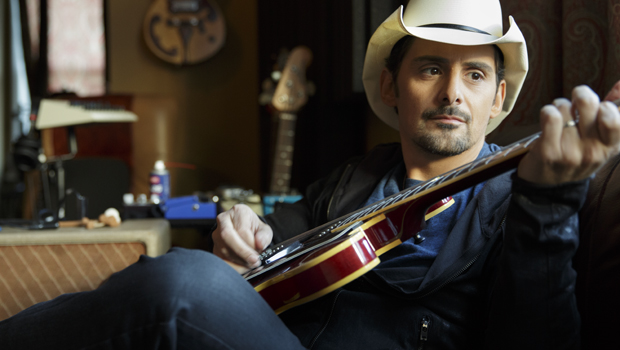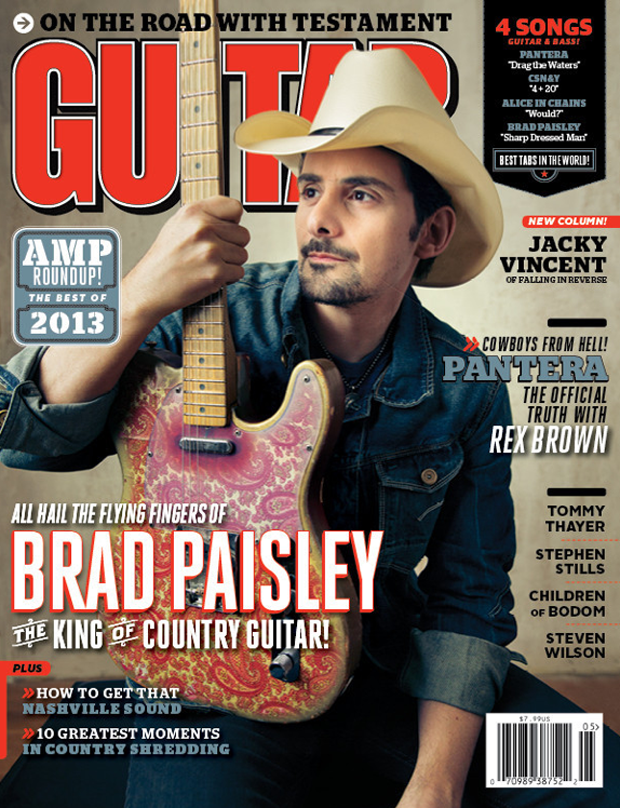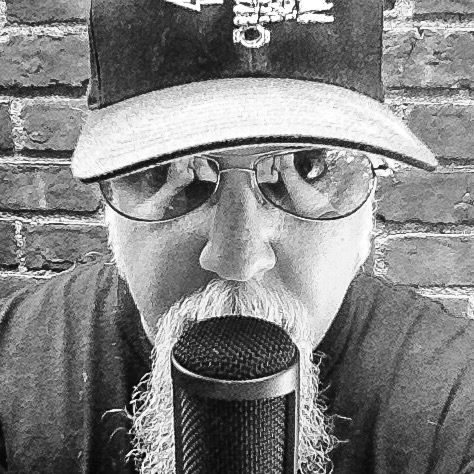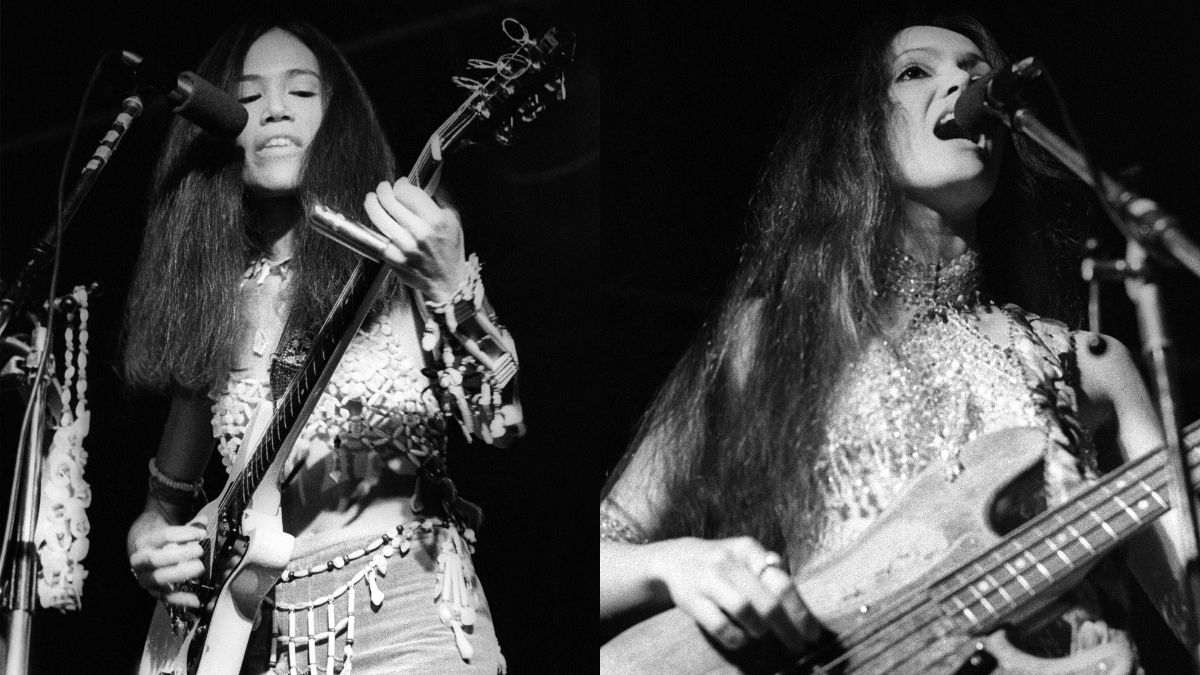Electric Cowboy: Brad Paisley Moves Beyond his Southern Comfort Zone with 'Wheelhouse'
All the latest guitar news, interviews, lessons, reviews, deals and more, direct to your inbox!
You are now subscribed
Your newsletter sign-up was successful

This is an excerpt from the May 2013 issue of Guitar World magazine. For the rest of this story, plus features on the 10 Essential Country Shred Guitar Songs, 10 Pieces of Gear Essential to Modern Country Guitar Tone and more, check out the issue at the Guitar World Online Store.
The inspiration for the title of Brad Paisley’s latest album, Wheelhouse, came from the phrase “in your wheelhouse,” which is a reference to the baseball term for the strike zone’s sweet spot, where a batter can comfortably hit a ball with maximum power and precision.
However, “wheelhouse” also refers to a rotating track switching platform in a rail yard that enables the movement of a train engine to tracks going in various directions. Each of these definitions apply to Paisley’s new album, as he delivers the fine-crafted, home-run hit country tunes that have made him one of country’s biggest stars over the past decade as well as a few unexpected curveballs that will take his fans by surprise.
With Wheelhouse, Paisley is entering a significant new chapter in his career, which from the beginning never really followed the typical Nashville formula. In the tradition of Merle Haggard and the Strangers or Buck Owens and the Buckaroos, Paisley has always recorded with the same band that he tours with—an uncommon practice these days when most artists record with Nashville’s deep well of studio musicians.
This time, Paisley pushed the envelope even further by producing the album himself and recording it in a studio he built in a farmhouse a short walk down the hill from his home located in an idyllic, remote countryside setting outside of Nashville.
Like the rail yard wheelhouse, the album takes listeners in many different directions. There’s the soaring melody of the first single, “Southern Comfort Zone,” followed by progressive bluegrass overtones of “Beat This Summer” and “Outstanding in Our Field,” a stomping rocker certain to become country’s summer party anthem of 2013.
The one common string throughout the entire album is Paisley’s tasteful guitar playing, which could be considered his sweet spot power-hitter comfort zone. As the album’s producer, Paisley was unleashed from any reins that might have previously held his guitar playing back, but wisely, he didn’t overindulge. Every song and solo has its fair share of “how did he do that?” moments, but he offers just enough to please guitar geeks without alienating his less instrumentally inclined listeners.
All the latest guitar news, interviews, lessons, reviews, deals and more, direct to your inbox!
As Paisley gives a tour of the studio, pointing out his pair of Trainwreck amps (a Liverpool “Hattie Mae” and a Rocket “Marcy”), discussing his preference for Mogami cable and waxing poetic about his Catalinbread Montavillian Echo pedal, he reveals how his passion for the guitar still remains his driving force. As we settle down to talk, he picks up his trademark 1968 Fender Telecaster, featuring a glowing, aged paisley finish, and plays passages from the album, using his guitar as much as his words to explain what he wants to say. While much of Paisley’s fame stems from his talents as a singer, perhaps his most eloquent musical statements, particularly on Wheelhouse, are his guitar solos, whether it’s the moody introspection of “I Can’t Change the World” or the bursting-at-the-seams exhilaration of “Runaway Train.”
What made you decide to become a guitar player?
My grandpa used to sit in a chair and play every day. He was a big fan of instrumental music, so I grew up listening vicariously to Chet Atkins and Les Paul. Most kids my age had never heard of them. He really liked country music and listened to a lot of Buck Owens and Johnny Cash. My grandpa was opinionated. He didn’t like certain kinds of music, especially if it didn’t have interesting playing in it. He wasn’t a fan of easy listening, and really, neither am I. I like songs that make you think, or songs that have incredible playing in them. It has to have great lyrics or playing—at least one of those two. He probably was the biggest musical influence in my life. One day he placed a guitar in my hands and said, ‘This will always be something you can use as an escape, a crutch, or to keep from being lonely.’ He was right.
Photo: Ari Michelson
For the rest of this story, plus features on the 10 Essential Country Shred Guitar Songs, 10 Pieces of Gear Essential to Modern Country Guitar Tone and more, check out the May 2013 issue at the Guitar World Online Store.

Chris is the co-author of Eruption - Conversations with Eddie Van Halen. He is a 40-year music industry veteran who started at Boardwalk Entertainment (Joan Jett, Night Ranger) and Roland US before becoming a guitar journalist in 1991. He has interviewed more than 600 artists, written more than 1,400 product reviews and contributed to Jeff Beck’s Beck 01: Hot Rods and Rock & Roll and Eric Clapton’s Six String Stories.

